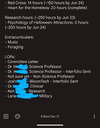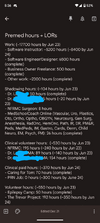Finally made it! Just wanted to put myself out there for questions since I did have a fairly successful cycle with 8 acceptances. Yes that’s excessive, more details on why that happened later.
I made a new account so that I can divulge more intimate details while remaining anonymous. But I’ve been active on SDN since the beginning of my path more than five years ago. I’m in my 30’s and have two kids under five. All you parents out there, you can do this!
Objective Stats:
Subjective Stats:
Application Cycle:
MD schools had no love for my app, that’s clear. The interview I received was for a low MCAT in-state school. Now, had my MCAT been 512…I think the story would’ve changed. Either way, flexibility is key for my family and I would’ve chosen the school that offered the most of it in the way they deliver academics.
What I would say helped me get A’s the most is being able to show proof of answering yes to these three questions:
A note on SDN. I joined this place before I began taking coursework, at the very beginning. In sum, I’m so thankful for the folks that tell it like it is. They’ve seen it all before and understand how to help. But don’t expect things sugar-coated. People here just don’t have the time to be empathetic and understanding in every response they type. I didn’t understand that until now, when I’m physically in medical school. Students, residents, and attendings—they’re all shy on time but SDN people for the most part really do want to be helpful. And they are! So my advice would be to never take things personal here. Go in, say your peace, get advice with both ears open, and go do it!
If I can do it with my stats, family responsibilities, and work obligations then so can you. So, get to it! And let me know if you have any additional questions.
EDIT:
Forgot that I also took Anatomy with UNE, so I added it to the list. I took the course mid-way through my application cycle to medical school to show I was still academically capable, since there was a two year gap between then and my most recent coursework (Biochem).
I made a new account so that I can divulge more intimate details while remaining anonymous. But I’ve been active on SDN since the beginning of my path more than five years ago. I’m in my 30’s and have two kids under five. All you parents out there, you can do this!
Objective Stats:
- MCAT of 503 with a 123 in CARS
- sGPA = cGPA = ~3.55
- A's in all online DIY post-bac coursework including:
- Bio I
- Bio II
- Orgo I
- Orgo II
- Biochem
- Anatomy (the only A-)
Subjective Stats:
- 5+ years working in challenging STEM industry
- B.S. and M.S. in non-biological sciences STEM major
- 500+ volunteer hours in ER while working full-time and performing DIY coursework
- 40+ hrs shadowing PCP’s in underserved areas
- No family ties to medicine or healthcare in any capacity
- Married with two kids under 5 years old
- First-generation college graduate
- Strong set of letters of recommendation with committee letter from undergrad university. The importance of strong LORs is often overlooked.
- Two institutional actions during undergrad
- Documented run-ins with law enforcement in youth.
- Yes, more severe than a speeding or parking ticket.
- No, not the rigor of felony.
- 5+ years since the institutional actions
- 10+ years since the run-ins with law enforcement
Application Cycle:
- Submitted both AMCAS and AACOMAS primaries by mid-June
- # schools applied to
- DO: All but perhaps 2 or 3 of them
- So, ~35 DO schools
- MD: Low MCAT in-state and regional schools
- ~10 MD schools
- DO: All but perhaps 2 or 3 of them
- Interviews, all of which I attended
- MD: 2
- DO: 12
- Acceptances
- MD: 0
- DO: 8
- Waitlists
- I was put on 5 additional DO waitlists but withdrew from them one by one as the acceptances rolled in.
MD schools had no love for my app, that’s clear. The interview I received was for a low MCAT in-state school. Now, had my MCAT been 512…I think the story would’ve changed. Either way, flexibility is key for my family and I would’ve chosen the school that offered the most of it in the way they deliver academics.
What I would say helped me get A’s the most is being able to show proof of answering yes to these three questions:
- Can you handle medical school?
- (+) Challenging STEM degrees
- (+) Super busy while nailing all A's in the post-bac
- (-) Low subsection MCAT score
- --> net (+)
- Do you want to be a doctor?
- (+) 500+ volunteer hrs
- (+) 40+ shadowing hrs
- (+) making a career change
- (+) discovered medicine on my own
- --> (+ + + +)
- Who supports your argument?
- (+) LOR from ER volunteer coordinator
- (+) LOR from manager at 5+ year job
- (+) LOR from shadowed PCP in high-needs area
- (+) LOR from chair of pre-health admissions committee
- (+) LOR from director at another volunteering organization
- --> (+ + + + +)
A note on SDN. I joined this place before I began taking coursework, at the very beginning. In sum, I’m so thankful for the folks that tell it like it is. They’ve seen it all before and understand how to help. But don’t expect things sugar-coated. People here just don’t have the time to be empathetic and understanding in every response they type. I didn’t understand that until now, when I’m physically in medical school. Students, residents, and attendings—they’re all shy on time but SDN people for the most part really do want to be helpful. And they are! So my advice would be to never take things personal here. Go in, say your peace, get advice with both ears open, and go do it!
If I can do it with my stats, family responsibilities, and work obligations then so can you. So, get to it! And let me know if you have any additional questions.
EDIT:
Forgot that I also took Anatomy with UNE, so I added it to the list. I took the course mid-way through my application cycle to medical school to show I was still academically capable, since there was a two year gap between then and my most recent coursework (Biochem).
Last edited:


